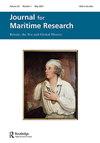巴巴里的缓慢死亡:19世纪初欧洲人试图根除北非海盗
Q3 Arts and Humanities
引用次数: 2
摘要
在许多描写巴巴里晚期的著作中,斯蒂芬·迪凯特1815年的进攻和埃克斯茅斯勋爵1816年对阿尔及尔的轰炸经常被视为巴巴里海盗的终结。本文通过考察从拿破仑的百日王朝到法国殖民时期的15年期间,西方列强不断攻击巴巴里国家,挑战了这一观点。尽管迪凯特和埃克斯茅斯的袭击引起了人们的注意,但既没有消灭海盗,也没有随后的袭击。拿破仑战争的结束改变了欧洲的权力关系,使得巴巴里海盗无法忍受;英国对意大利小国的责任和保护(大部分是海盗的猎物)在战后仍在继续。英国作为地中海“保护者”的新地位和维也纳会议对海盗的谴责消除了欧洲对海盗的容忍,从1815年到1830年对巴巴里的10次不同袭击就可以看出。战后北非的不稳定和反复出现的环境危机也削弱了巴巴里国家。海盗们在埃克斯茅斯的轰炸之后依然存在,在北非,海盗行为在法国入侵阿尔及尔之后依然存在。欧洲权力关系的变化通过对巴巴里的殖民消灭了海盗制度,而不是对其港口的孤立攻击。本文章由计算机程序翻译,如有差异,请以英文原文为准。
Barbary’s slow death: European attempts to eradicate North African piracy in the early nineteenth century
ABSTRACT In many works on the late Barbary period, Stephen Decatur’s 1815 attack and Lord Exmouth's 1816 bombardment on Algiers are frequently seen as the end of the Barbary corsairs. This article challenges that idea by examining the 15-year period from Napoleon’s Hundred Days through French colonisation when Western powers repeatedly attacked the Barbary States. Despite the attention received by Decatur or Exmouth's attacks, neither eliminated the corsairs nor did any attack that followed. The end of the Napoleonic wars changed European power relations making the Barbary corsairs intolerable; Britain’s responsibility for and protection of small Italian states (the bulk of the corsairs prey) continued after the war. Britain’s new position as ‘protector’ of the Mediterranean and the Congress of Vienna’s denouncement of piracy eliminated European tolerance for the corsairs as demonstrated by the 10 different attacks on Barbary between 1815 and 1830. Post-war instability and repeated environmental crises across North Africa also weakened the Barbary States. Corsairs endured beyond Exmouth’s bombardment, and piracy lasted in North Africa beyond French invasion of Algiers. Changes in European power relations eliminated the corsair institution through the colonisation of Barbary, not isolated attacks on its ports.
求助全文
通过发布文献求助,成功后即可免费获取论文全文。
去求助
来源期刊

Journal for Maritime Research
Arts and Humanities-History
自引率
0.00%
发文量
0
期刊介绍:
The Journal for Maritime Research ( JMR ), established by the National Maritime Museum in 1999, focuses on historical enquiry at the intersections of maritime, British and global history. It champions a wide spectrum of innovative research on the maritime past. While the Journal has a particular focus on the British experience, it positions this within broad oceanic and international contexts, encouraging comparative perspectives and interdisciplinary approaches. The journal publishes research essays and reviews around 15-20 new books each year across a broad spectrum of maritime history. All research articles published in this journal undergo rigorous peer review, involving initial editor screening and independent assessment, normally by two anonymous referees.
 求助内容:
求助内容: 应助结果提醒方式:
应助结果提醒方式:


